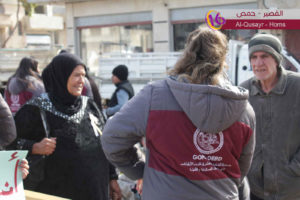First-hand perspective: CHS supports NGO navigating aid cuts in Syria
As the sector navigates severe cuts to global humanitarian funding, local actors are bearing the brunt of sudden programming constraints.
In Northeast Syria, the ramifications are immediate and severe—jeopardising both the continuity of services and challenging organisations to stand by principles of accountability to affected populations when personnel are stretched.
Sara Savva, Deputy Director-General of GOPA-DERD, a faith-based national organisation that joined the CHS in 2023, spoke to the Alliance from Damascus, where she was keen to underscore how the Core Humanitarian Standard (CHS) continues to serve as an operational framework in the face of untold disruption.
“Of course, we felt it in Syria as well,” Savva said. “There is a global impact, [but] we deal with people affected by crisis first hand. We know how much [these cuts] are having a negative impact on people who have been counting on this humanitarian aid.”
US government aid suspensions have had tangible psychosocial consequences. “People had already started to receive some support before it was cut,” she explained, “and they drew a life map, a survival map for months to come, dependent on this aid they were promised. It is devastating.”
To mitigate the fallout, local actors are attempting to include affected households into alternative programming. “Our team in the Northeast is seeing if we can integrate them into other programmes,” said Savva. “We’re trying to expand these as much as possible by reducing other costs.”
This is creating internal strain, however. “The staff are now feeling so much pressure because they’re doing two jobs – mostly unpaid, and voluntary – in order to make up for the gaps that have been created,” she said. “They’re doing what they have to do because they can see with their own eyes, the number of people that have been literally just left behind to survive on their own.”
The abrupt withdrawal of aid has implications beyond logistics. “To leave people behind would be to create unintentional social tension,” Savva noted. “Other issues may arise in the near future if this is not dealt with quickly.”
Here, the CHS has proven essential. The organisation had worked to gain trust with local communities over the years of conflict ,and joined the CHS Alliance in 2023 to get support in applying the CHS in a systematic way.
“The CHS has been extremely helpful,” she said. “We always wanted to make sure people’s rights are accounted for and then we learned about the CHS through partners. Finally we realised that what we had always aimed for had a name: the CHS nine commitments. We know it will help us to reach a larger number of community members.”

Volunteers and staff from GOPA-DERD support communities in Syria
Going forward, Savva calls for CHS verification to play a more active role in global funding criteria. “We should really make funding conditional,” she said. “These funds should go to entities that are CHS Alliance members—entities that have proven to be committed to the accountability that CHS highlights.”
In closing, Savva issued a call to action for the sector. “Now is the time for the CHS to play a much bigger role in filtering who gets the funding, and to really be clear about how much of it is lost before reaching the people it’s meant for,” she said. “When we speak about all nine commitments, it is something we must commit to seriously—as organisations and as a sector.”
Timeline of GOPA-DERD
- In 1994, GOPA-DERD was established as the development arm of the Greek Orthodox Patriarchate of Antioch and All the East (GOPA).
- In 2003, war broke out in Iraq, causing a large influx of Iraqi refugees into Syria. GOPA-DERD expanded its work to include humanitarian aid, and hired specialized staff with a focus on protection across more Syrian governorates to accommodate the largest number of refugees possible. They also worked with host communities to build social cohesion.
- In 2011, the war began in Syria – escalating rapidly, causing massive destruction and loss of basic needs, across the entire country. GOPA-DERD revised its programming strategy to include not only emergency relief response, but also early recovery and sustainable development. It expanded its outreach team to cover the whole of Syria.
- In 2023, GOPA-DERD joined the CHS Alliance. They have started the process of CHS self-assessment.
- In 1994, GOPA-DERD was established as the development arm of the Greek Orthodox Patriarchate of Antioch and All the East (GOPA).
- In 2003, war broke out in Iraq, causing a large influx of Iraqi refugees into Syria. GOPA-DERD expanded its work to include humanitarian aid, and hired specialized staff with a focus on protection across more Syrian governorates to accommodate the largest number of refugees possible. They also worked with host communities to build social cohesion.
- In 2011, the war began in Syria – escalating rapidly, causing massive destruction and loss of basic needs, across the entire country. GOPA-DERD revised its programming strategy to include not only emergency relief response, but also early recovery and sustainable development. It expanded its outreach team to cover the whole of Syria.
- In 2023, GOPA-DERD joined the CHS Alliance. They have started the process of CHS self-assessment.

